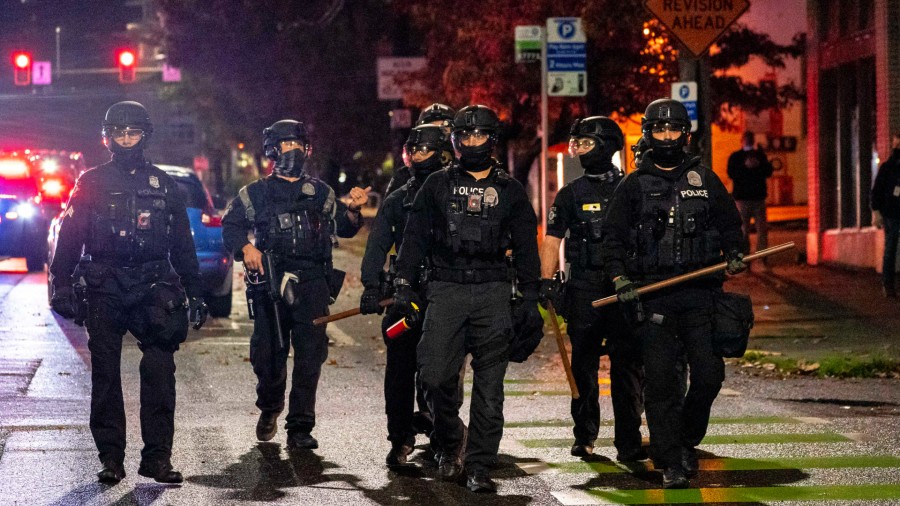Report on 2020 protests recommends new training for SPD, debunks “mob psychology”
May 20, 2022, 10:29 AM

Police follow protesters as they move through the city during racial justice protests on November 3, 2020 in Seattle, Washington. (Photo by David Ryder/Getty Images)
(Photo by David Ryder/Getty Images)
While SPD’s operational approach to the 2020 protests was underpinned by contemporary science, it also drew on the flawed and outdated theory of “mob psychology” to understand the crowd dynamics leading to underutilization of de-escalation through dialogue and over-reliance on indiscriminate and disproportionate use of force, according to a new report on crowd psychology examining the SPD response to the early days of the protests over the murder of George Floyd.
“This serves to formally debunk that notion of crowd contagion or mob psychology, where there was a belief that if you have these four or five bad actors, they will contaminate the rest of the crowd, and the crowd then becomes this angry mob that’s a monolith. The science just is showing that that’s not necessarily true, that you need to use differentiation and deal with the bad actors. But let the other folks who are there continue to exercise their First Amendment rights,” said Seattle Inspector General Lisa Judge, who commissioned the report on the first four days of the protests to build on the ongoing Sentinel Review her office is conducting on SPD’s protest response.
The study suggests that SPD became locked in a cycle of escalation over the first four days of the protests — May 29 through June 2 — leaving few options other than the deployment of public order resources ready to use force when SPD deemed it necessary and lawfully justified.
National movement prompts thousands of abortion rights activists to flood the streets of Seattle
“This report really highlights the inextricable relationship with how police actions are interpreted by crowds as being either legitimate or illegitimate and the impact that really has on the ability to de-escalate or whether the crowd gets escalated by the actions of police,” explained Judge.
Judge says the importance of this is really building an understanding and confirming how the legitimacy or illegitimacy of your actions as a police officer out there can really impact crowd dynamics.
“I think it’s a critical piece of understanding what really works to deescalate a large group of protesters and what can serve to instead escalate them without intending to,” she added.
Bottom line – just because you can, doesn’t mean you should.
“The law says officers can take certain actions, their policies support that. But is that really being viewed as legitimate in the eyes of community? It’s that gap there that if people see officers doing things that they don’t view as a legitimate restriction on them, that’s what turns the crowd,” explained Judge. “And that’s what turns individuals in the crowd into people who are far more angry, and wanting to take other measures other than just peacefully exercising first amendment rights, because they feel like their rights are now being infringed, wrongfully.”
The OIG is working with SPD to ensure this is built into their philosophy on crowd management.
“I think the shift really should be away from crowd management and control to crowd facilitation. And crowd safety,” said Judge.
The report found that SPD crowd management policy and training currently places facilitation of First Amendment rights as a primary strategic goal, but that’s caveated against the police duty to protect public safety and prevent crime.
The objective tension between the competing goals leaves SPD reliant on a “meet and greet” approach carried out mostly by bicycle units.
Instead, the report says the SPD needs to increase its capacity to manage crowd events by communicating with those in the crowd, something there was little to no examples of during the early days of the 2020 protests.
Seattle Police Chief Adrian Diaz says that’s the idea behind SPD’s Public Order Engagement Team – or POET. POET is a newly created, specially trained unit that includes traditional officers as well as unarmed Community Service Officers (CSO) where they are on the front end trying to start a dialogue with organizers of a protest or event and build relationships to ensure an open line of communication should a situation arise.
“We want to make sure that we don’t have to use officers to be standing in line, and we don’t want to use officers to be in that level of confrontation. So how can we do it on the front end, be more preventative, and build those relationships,” Diaz explained.
Chief Diaz says it worked well in the recent Roe v. Wade protests the city experienced, including one where a preacher showed up.
“He’s spouting this stuff that it becomes very emotionally charged,” explained Diaz. “He then gets assaulted by the group and we’re trying to mitigate that because, number one, we’re trying to make sure that both have an opportunity for their level of free speech and that we’re trying to make sure that we quell issues that are going on, and then developing those relationships.”
In another Roe v. Wade event, Diaz says that relationship building paid off for officers.
“One of the first deployments during the Roe v. Wade events, is officers actually spent a lot of time during the whole event with the groups. And at the end of the day, they started offering officers water, and that’s because they built that connection and built that relationship,” said Diaz.
Without those relationships, there can be misunderstandings, wrong assumptions, and over-response.
“That is so important for us to be able to establish who we are, we want to show that we’re not an occupying force and that we are working with the community,” explained Diaz. “And we have those same sometimes similar interest in whatever that people might be protesting or advocating for, and our officers probably have the same feelings of supporting that.”
Another step SPD is taking is the launch of a new pre-academy training for new recruits called Before the Badge.
“Bringing recruits in 45 days prior to the academy, and really instilling social, emotional learning and brain development, in giving them the skills to be able to have their focus on their own wellness, and be able to create listening sessions and opportunities to have a dialogue with communities that have had a level of mistrust,” said Diaz.
“Those listening sessions and opportunities to just have those conversations will translate into a situation where they can be used in a POET situation because they’ve had those difficult conversations prior to ever being involved in some sort of protest or situation,” he added.
“When you talk about tactics and law, that’s like two legs that you’re kind of teetering through your career on,” Seattle Police Officer Kim Bogucki recently told KIRO 7 TV’s Linzi Sheldon. “If you add wellness and you add community relations, now you have a real stable, you have four legs to go through your career on.”
She says a big part of this training will be learning individual communities’ histories and nuances.
“So the way that you interact with the LGBTQIA community, even understanding what that is,” she said. “The East-African community, the different factions within that community as a female, maybe I don’t want to put my hands on a Muslim person if I have a male officer right here because it’s a sign of disrespect. So how do we teach some of these little cultural nuances that maybe none of us grew up around?”
Bogucki says mental health and having a way to reset is critical to new recruits and longtime officers, and Chief Diaz agrees.
“A healthy officer will create healthy outcomes,” said Diaz.
Diaz has been shifting things in this direction for existing officers and dealing with how those officers might feel about all the change.
“That doesn’t mean that everybody’s like, yes, the chief said this and so I’m 100% on board, but it is a shift that people are embracing. They say, look, we have to make sure that we are doing everything we can to de-escalate, that we’re taking all of our mindful acts of trying to make sure that we’re compassionate, empathetic, and we’re approaching situations in giving people different potential options to have a safe resolve to it. So I’m encouraged to see all the hard work that our officers have done. But you know, there’s more to come,” he said.
SPD report discovers 80% of 911 calls were for non-criminal events
“This is all just part of how our department wants to operate.”
“For me as chief, I am really focused on trying to build a level of compassion and empathy in the department,” said Diaz.
Inspector General Lisa Judge says much of this philosophy has worked well in the U.K. and Sweden, and she hopes other U.S. law enforcement agencies pay attention to what happens here in Seattle.
“I think this may serve as some foundational stuff for other police departments around the world to build an understanding of how you relate with the crowd, what really can be impactful in terms of de-escalating crowds, really the critical piece of communication as a de-escalation tool,” she said.
Both Diaz and Judge stressed what a great example this work has been of collaboration between OIG and SPD.
Follow Hanna Scott on Twitter or email her here.













